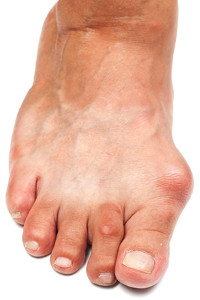
Wilmington (937) 382-2347
Fax
(513) 932-1606

Wilmington (937) 382-2347
Fax
(513) 932-1606
 While most people tend to take having pain free feet for granted, people with bunions do not have this privilege. A common myth is that only people of old age develop bunions; this, however, isn't often true. Approximately 30% of adolescents have developed bunions, and a majority of these bunion sufferers are girls. While footwear is commonly a cause of the deformity, genetics are also capable of playing a role in its development. Bunion treatment depends heavily on the severity of the condition. In mild cases, shoe inserts and wider shoes can be helpful; in severe cases, however, surgery may be needed. Nevertheless, you should have your podiatrist determine the severity of your bunion so that he or she can provide the best route of treatment for you.
While most people tend to take having pain free feet for granted, people with bunions do not have this privilege. A common myth is that only people of old age develop bunions; this, however, isn't often true. Approximately 30% of adolescents have developed bunions, and a majority of these bunion sufferers are girls. While footwear is commonly a cause of the deformity, genetics are also capable of playing a role in its development. Bunion treatment depends heavily on the severity of the condition. In mild cases, shoe inserts and wider shoes can be helpful; in severe cases, however, surgery may be needed. Nevertheless, you should have your podiatrist determine the severity of your bunion so that he or she can provide the best route of treatment for you.
If you are suffering from bunions, contact Dr. Gerald Perelman of Ohio. Our doctor can provide the care you need to keep you pain-free and on your feet.
What Is a Bunion?
A bunion is formed of swollen tissue or an enlargement of boney growth, usually located at the base joint of the toe that connects to the foot. The swelling occurs due to the bones in the big toe shifting inward, which impacts the other toes of the foot. This causes the area around the base of the big toe to become inflamed and painful.
Why Do Bunions Form?
Genetics – Susceptibility to bunions are often hereditary
Stress on the feet – Poorly fitted and uncomfortable footwear that places stress on feet, such as heels, can worsen existing bunions
How Are Bunions Diagnosed?
Doctors often perform two tests – blood tests and x-rays – when trying to diagnose bunions, especially in the early stages of development. Blood tests help determine if the foot pain is being caused by something else, such as arthritis, while x-rays provide a clear picture of your bone structure to your doctor.
How Are Bunions Treated?
If you have any questions, please feel free to contact our office located in Wilmington, OH . We offer the newest diagnostic and treatment technologies for all your foot care needs.